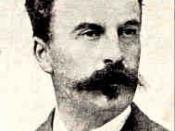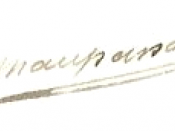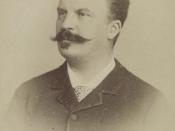How far would one person go to make the truth be known? If you know that you are innocent of an accusation, do you have to tell all you know? Guy de Maupassant's character, Hauchcome, in "A Piece of String", is the type of character who needs everybody to agree with him to validate his opinion. Because of his need to be validated by others, Hauchcome makes his situation worse.
Hauchcome is accused of picking up a pocketbook and is taken to the mayor to be questioned. In the beginning of the story, Hauchcome picks up a piece of string and doesn't want to be seen committing such a frugal act. He knows that a neighbor is watching him, so he searches for an object that doesn't exist. Most people nowdays wouldn't mind being seen picking up a piece of string. The matter isn't really a big deal and a person's reputation isn't at risk for being ruined for such simple act.
If it were myself that picked up the piece of string, I would have picked it up and went about my normal business.
The mayor calls upon him to be interrogated about the object in question (a missing pocketbook) and is barely proven innocent. Some other person picked it up and returned it. After he is questioned and proven innocent, Hauchcome insists on proving to everybody he meets that he is innocent of the accused crime. It isn't enough for him that he and his accusers know he is innocent, so he has to make sure that everybody knows he is. By telling everybody, he just makes his innocence more questionable. I wouldn't have tried to prove and reprove my innocence to every person I knew. As long as my accusers and I knew I was...



Interesting.
This is an interesting entry, I'd never heard of this before.
1 out of 2 people found this comment useful.